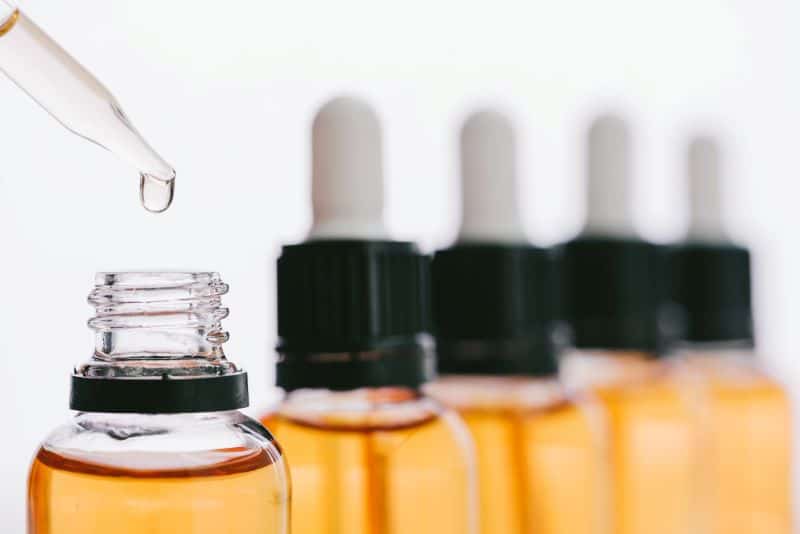Our Top Picks: CBD For Alzheimer’s & Dementia
CBD for Alzheimer’s and neurodegenerative diseases is currently being examined by the medical community. Before adding CBD to your diet or supplement routine, consider speaking with your doctor.
There is no hard evidence showing that CBD or CBD products can stop, prevent or slow the progression of Alzheimer’s. However, CBD has been shown to be effective in treating some of the most common behavioral symptoms of the disease, such as mood swings, agitation, and aggression.
In our new golden age of natural medicine, the cannabis compound cannabidiol (CBD) is receiving by far the most attention, both in the medical field and the mainstream. CBD’s medicinal and therapeutic properties have been linked in studies to reduced or improved symptoms associated with various disorders. These include:
- Chronic Pain Disorders
- Insomnia
- Anxiety Disorders
- Seizures and Epilepsy
- Obsessive-Compulsive Disorder
- Depression
- Inflammatory Diseases
There are other disorders that CBD is now commonly used for, but what about Alzheimer’s Disease (AD) and dementia?

CBD & Common Symptoms of Disorders Related to Dementia
As of this writing, there is no hard evidence showing that CBD or CBD products can stop, prevent or slow the progression of dementia. However, CBD may be effective in treating some of the most common behavioral symptoms of the disease, such as mood swings, agitation, and aggression.
What is CBD in a nutshell, and where does it come from?
Cannabidiol or CBD is one of two primary compounds found in the cannabis plant, the other being tetrahydrocannabinol (THC).
Unlike THC, CBD is non-psychoactive —meaning it does not alter a patient’s state of mind or cognition of time — nor does it provide the “high” popularly associated with cannabis consumption. Instead, there is a growing body of research suggesting that CBD has the potential to provide a variety of medicinal and therapeutic benefits.
Aside from the cannabis plant, CBD can also be safely sourced from hemp. Because of this, CBD products such as oils, concentrates, isolates and tinctures are legal throughout the United States.
Currently, there is no evidence of any known benefit to the introduction of psychoactive compounds (such as THC) to patients suffering from Alzheimer’s and other forms of dementia.

CBD Oil for Alzheimer’s: How It All Works
Alzheimer’s disease is caused by the buildup of protein amyloids (commonly called “plaques”) and fiber bundles in the brain, which results in the blocking of neural signal processing and the gradual destruction of nerve cells. A common external manifestation of this process is mild memory loss, which can worsen into a seriously debilitating condition over time.
Common accompanying symptoms are disorientation, confusion, mood swings and a steady decline in the ability to communicate. While Alzheimer’s is still impossible to diagnose with full certainty, a series of tests and magnetic resonance imaging (MRIs) can determine the likelihood of the disease to a reasonable degree.
In the laboratory: where CBD comes in
A California study conducted in June 2016 by the Salk Institute for Biological Studies found that cannabis compounds including CBD can remove plaque-forming proteins from lab-grown neurons.
A similar study found that CBD oil administered to mice exhibiting symptoms of Alzheimer’s not only produced improvements in their cognitive ability; the mice also showed less evidence of amyloid accumulation in their bodies.
These and other studies have long produced evidence of the neuroprotective properties of cannabis compounds. For this reason, medical researchers continue exploring CBD oil’s viability for Alzheimer’s and other diseases categorized as forms of dementia.
Family members and care workers are increasingly turning to CBD as a strategy to manage aggression and other disruptive behaviors.
A recent news report out of Canada described how CDB had helped reduce anxiety and frustration and improve mood in both a 76-year-old-male patient and a 92-year-old female.
Other methods to manage these negative behaviors include physical restraint or medical sedation, so CBD is seen as a clear improvement among caregivers and close relatives.
While a number of laboratory studies have provided promising early evidence that cannabinoids can remove Alzheimer’s proteins from the brain, they haven’t yet been able to reproduce these effects in human patients. For this reason, the jury is still out on whether CBD and CBD products could indeed be used to treat dementia in the future. It’s also the reason more ambitious research and study is needed.

Choosing a CBD oil for Alzheimer’s
We’ve spent countless hours searching for the best, most reliable CBD companies. In our opinion, these are the three best-quality CBD oils available right now.
Broad Spectrum CBD Tincture – Koi Naturals
Koi Hemp Extract Tinctures are a broad-spectrum product that is free of THC and have been formulated to provide balance in your life. There are four strengths available (250mg, 500mg, 1000mg, and 2000 mg).
Koi offers its customers hemp extract tinctures with no need for concern about the presence of THC. It has less than 0.001% concentration level, meaning you can use this without worrying if those effects will be unpleasant to you!
The naturally occurring terpenes make these an even more all-natural choice, bringing balance into your CBD experience.
Koi has transparent in-house quality control. Each batch of their products comes with an independent Certificate of Analysis, so you know every milligram spent was worth it.
[maxbutton id=”9″ url=”http://track.revoffers.com/aff_c?offer_id=178&aff_id=5277&url_id=2987″]
Full Spectrum Organic CBD Tincture – Joy Organics
Joy Organics has produced the most delicious flavors of CBD oil we’ve tried. We highly recommend their tinctures, which are often ranked among the top 10 lists online for taste and quality.
Joy Organics has always been a big supporter of the legal movement for cannabis and CBD, and they were one of the first to offer high-quality CBD products. They provide copies of Certificates Of Analysis (COAs) on every product page in case you want more information about what’s going into your body.
A relative with dementia may find it difficult to take any kind of medicine – but when they take Joy Organic’s tasty flavored oils, you can be sure they’ll enjoy the taste.
[maxbutton id=”9″ url=”https://shrsl.com/2uald”]
CBD + CBN Oil Calming Tincture – CBDfx
CBDfx’s CBD oil tinctures are a great place to start if you’re looking for relief for a relative suffering from dementia. Each bottle contains CBN (aka “the relaxation cannabinoid”), which binds to your CB1 receptors and may produce a sedative-like effect. Reviewers describe them as magic in an inexpensive little dropper!
Their propriety blend of CBD, CBN, and terpenes is intended to calm the user down and reduce stress and anxiety.
Their products remain affordable while still ticking all the boxes when it comes to Certificates of Analysis and Lab Reports.
And with frequent promos on their site, buyers can save even more money on their CBD.
[maxbutton id=”9″ url=”https://track.revoffers.com/aff_c?offer_id=37&aff_id=5277&url_id=983″]
Alzheimer’s & Dementia: What’s The Difference?
While the two terms are used interchangeably, they are quite different from one another. Dementia is what’s known as an “umbrella term” — one used to describe a group of brain disorders that impair a patient’s memory, reasoning or thinking ability. Alzheimer’s disease is just one of these disorders.
There are many other forms of dementia, including Parkinson’s disease, Lewy Body Dementia (LBD) and Creutzfeldt-Jakob disease. Of all these various forms, Alzheimer’s is simply the most well-known. The most common symptoms of the onset of dementia include:
- A progressive decline in memory skills
- Drastic changes in ability to communicate
- Affected judgment or reasoning
- Uncharacteristic language and/or thinking
- Severely decreased attention and focus
Dementia is different from chronic pain disorders such as arthritis and gout, or inflammatory diseases such as asthma and coeliac disease because it affects brain function directly.
While hereditary factors are the most compelling possibility currently being explored, the root causes of dementia in its many forms are still largely undetermined. In the same way, medical researchers are still hard at work finding a cure for these disorders.
Hallmarks of Dementia & The Viability of CBD Dementia Medication
While Alzheimer’s is indeed the most well-known form of dementia, it is certainly not the only one worth noting. Equally serious types of dementia are unfortunately common in American society and usually begin after the age of fifty. Some examples include:
Vascular Dementia is the second most prevalent form in the United States. Vascular dementia is typically caused after a stroke or severe trauma, characterized by blockages or damage in blood vessels that prevent an adequate blood flow to the brain.
Instead of memory loss, the first symptoms of vascular dementia are usually complications in a patient’s judgment and/or planning abilities. Other names for this disease are Post-Stroke Dementia and Multi-Infarct Dementia.
Lewy Body Dementia is another well-known form of dementia caused by the abnormal buildup of the protein alpha-synuclein in the cortex — which is the area of the brain responsible for learning and memory.
The first symptoms of lewy body dementia are a diminished attention span and mild to moderate loss in coordination. Because of this, lewy body dementia is sometimes mistaken for the onset of Parkinson’s disease at first. Advanced symptoms include memory loss, erratic sleeping patterns and hallucinations.
One major factor common to all forms of dementia is a disruption to the supply of blood or vital neurotransmitters to the brain, whether caused by damage or buildups of protein. In fact, because of this vital similarity, it can be difficult for a doctor to determine which type of dementia a patient is suffering from in the initial examination.
As established in the Salk Institute study, cannabinoids, including CBD might help remove abnormal buildups of protein. There is also plenty of evidence in scientific literature proving CBD’s anti-inflammatory and vasodilative properties, both relieving the effects of damage or constriction in vital blood vessels. CBD is also thought to effect circadian rhythms, regulating and promoting healthy sleep cycles in patients showing signs of dementia.
CBD, Dementia & The Proper Dosages For Medicinal Use
There are several considerations to make for patients considering CBD for Alzheimer’s and dementia.
The most significant factors to consider are the patient’s age, height, and weight, as well as the severity and stage of his or her disease. As part of a prescription, any qualified physician can ascertain the correct micro, standard and macro dosages according to these considerations.
As a simple supplementary or home medication, CBD dosages can be calculated using Leinow and Birnbaum’s “step-up method,” which involves the patient starting at 1-2mg in week one (depending on his or her body weight) and then progressing by 2-4mg every following week until a noticeable change in behavioral symptoms is reported. This is an example of a step-up table for standard dosages; starting and incremental values would increase and decrease for micro and macro dosage tables.
While CBD is not currently considered a viable cure for any form of dementia, numerous independent studies and anecdotal testimonies that may improve patients’ quality of life. Ultimately, time and continued research will be necessary for a reasonable consensus to be formed within the medical and scientific communities.
*The products we recommend are selected independently. Healthy Minded currently runs without profit, so please help us to earn a small commission when you click one of the links and make a purchase.


